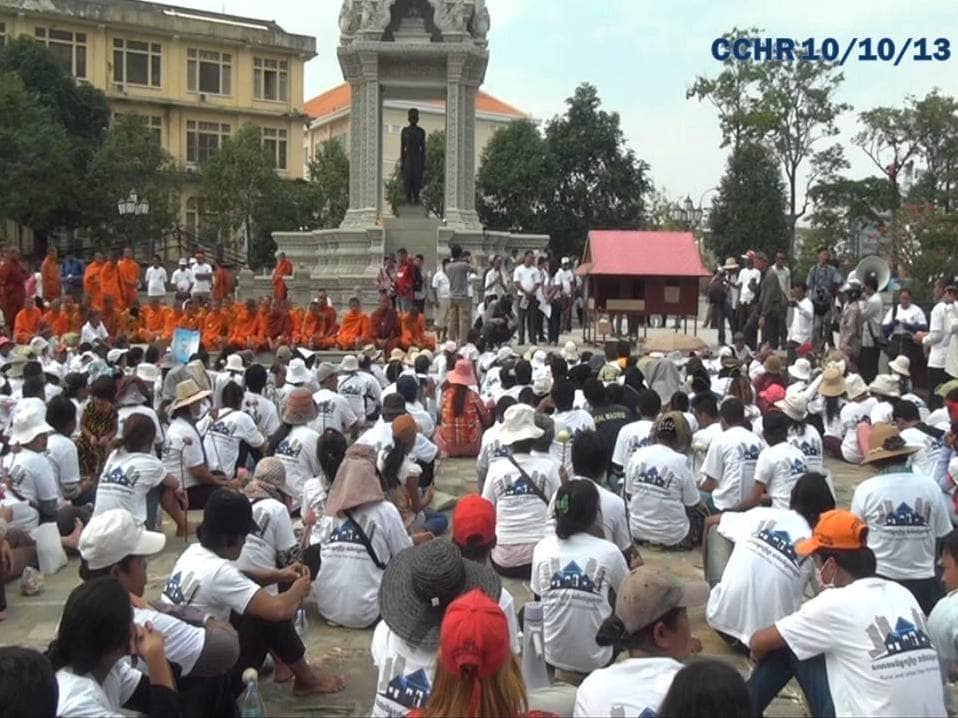While it is understandable that Cambodia wants to uphold peace during this tense time, this should not be at the expense of citizens' rights to peacefully demonstrate when there is no reason to believe that they would be jeopardising security, safety or public order by doing so.
The Cambodian Center for Human Rights (“CCHR”) would like to highlight and express concern regarding the continued negative reaction from Cambodian authorities in response to requests or notifications by civil society groups attempting to hold peaceful demonstrations in Phnom Penh. CCHR would like to remind the Royal Government of Cambodia (“RGC”) and the Phnom Penh municipal authorities that it is their duty, not to restrict free assembly, but to facilitate it through maintaining peace and public order.
5 October 2013 was World Teachers’ Day and seeing as 5 October was a public holiday in Cambodia, the Cambodian Independent Teachers’ Association (“CITA”) plans to mark World Teachers’ Day on 13 October, by holding a peaceful meeting at Freedom Park and then organising a march to the facilities of the Ministry of Education, Youth and Sport, the Prime Minister’s Cabinet, and the National Assembly to submit a petition. CITA sent a notification letter to the local authorities informing them of their plans, to which they received a negative response. This type of negative response from the authorities when civil society groups notify them of planned gatherings and marches, has become a regular occurrence. On 10 October 2013, a group of civil society representatives and communities affected by land rights violations celebrated World Habitat Day at Wat Phnom in Phnom Penh, despite the fact that their request to gather there had been rejected by the authorities, who asked them to celebrate in private rather than in a public area such as Wat Phnom.
It should be noted that the Cambodian Law on Peaceful Assembly does not even require groups to request permission from authorities to hold peaceful demonstrations, but merely to provide the authorities with notification. Article 9 states that the competent authorities must respond positively in writing to the notification from groups, unless the proposed peaceful assembly falls on a public holiday or there is clear indication that the demonstration may result in danger or may seriously jeopardize security, safety and public order. None of these exceptions outlined in Article 9 apply to the above demonstrations. In addition the reason cited by the authorities for refusing CITA’s demonstration was that, keeping in mind the current political deadlock, the demonstration might turn “political”. Even if a demonstration is political however, this is not a legal reason for preventing it from taking place. The Constitution of the Kingdom of Cambodia upholds the right of all citizens to participate in the political life of their nation. It is understandable that the RGC wants to uphold peace during this tense time, however this should not be at the expense of citizens’ rights to peacefully demonstrate when there is no reason to believe that they would be jeopardizing security, safety or public order by doing so.
CCHR Project Coordinator, Ms. Sorn Ramana comments: “The right to freedom of assembly and expression are guaranteed under the Cambodian Constitution and under international human rights laws ratified by Cambodia. The Law on Peaceful Assembly was passed in 2009 specifically to protect the right to peaceful assembly. However, in practice, Cambodian authorities and law enforcement often disregard what has been guaranteed by the law. The authorities need to recognize their duty to facilitate demonstrations, ensuring that they remain peaceful and that people are allowed to express themselves in public, without endangering the rights of others. The authorities should cooperate with demonstrators, rather than always trying to restrict their rights unnecessarily. It is about time that what was written in law is implemented in practice.”



